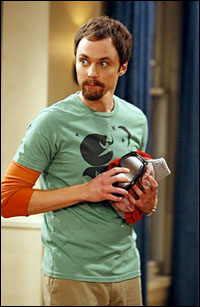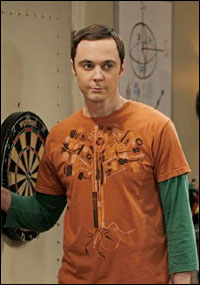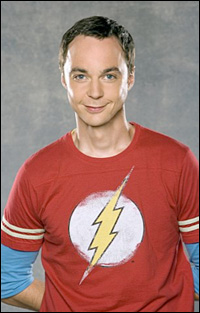
*
A few months ago, Jim Parsons had what he calls a "Come to Jesus" call with his manager and two of his agents. After more than six years away from theatre, the Emmy Award winning actor who plays savant-like theoretical physicist Sheldon on the hit CBS sitcom "The Big Bang Theory" felt that it was time to scratch an itch he was having to return to the stage — and that his three-month summer hiatus from "Big Bang" was a good opportunity to do it.
"I said, 'All signs point to me wanting to do some theatre this summer.' If we see a movie that we all really like, I'm certainly open to that. But nothing's on my radar right now that I'm excited about. The only thing that's getting me excited, that's making my palms sweat, is when we talk about this notion of doing a theatre show this summer," says Parsons, pausing for a beat, and then with deft comic timing and charming self-deprecation, blurting out, "Theatre show? Oh, God, I sound like my mother. Everybody's going to think, Oh, this guy has never done a play before."
Indeed, despite that unintentionally comic "theatre show" reference, Parsons is no stranger to the stage. He first got his start as an actor in the Houston theatre scene, where he was a founding member of the Infernal Bridegroom Theatre Co. and a regular at Stages Repertory Theatre, performing in everything from Samuel Beckett's Endgame to Guys and Dolls. He later studied classical theatre in a two-year program through the University of San Diego and the Old Globe, and assayed roles in everything from The Tempest at the Houston Shakespeare Festival to Tartuffe at La Jolla Playhouse.
"Doing live theatre has been such a part of my life for all of my adult years," Parsons says. "And I think that it was only going to be a matter of time before it reared its ugly head — that need to want to do theatre again." Within a few days of that conference call with his agents and manager, they got back to him with the possibility of starring in the just-announced revival of The Normal Heart, Larry Kramer's landmark 1985 play about the early days of the AIDS crisis. Parsons quickly jumped at the unique opportunity, and a week later he ended up getting cast as young gay Southern transplant Tommy Boatwright in the production, which begins previews on April 19 and opens on April 27 at the John Golden Theatre (co-starring Ellen Barkin, Joe Mantello, John Benjamin Hickey and Lee Pace).
| |
 |
|
| Parsons on "The Big Bang Theory." | ||
| CBS |
Parsons recalls this dynamic unfolding while he was working in theatre in Houston, wanting to take the next step in his career, and thinking about going to grad school for acting.
"I just felt that I needed to get out of town. But I was never really one to just pack up my knapsack and hit the road. I'm brave, but I'm not that brave. So I thought, you know, grad school would be a wonderful thing, not only an excuse to get out of town, but a useful thing for me to do… And I remember very distinctly making some sort of conscious decision to go ahead and share with people [that] I was auditioning for grad schools and that I really wanted to do this. It was one of the first examples in my life when I realized that if you really put it out there and tell everybody that you want something, you magnify for yourself how important it is, which probably makes you work that much harder at it."
First produced at the Public Theater in 1985 to great acclaim, The Normal Heart has been mounted several more times at Off-Broadway venues in the intervening 25 years, in addition to dozens of regional stagings. The new production, directed by Joel Grey (with an assist by George C. Wolfe), will mark not only the 25th anniversary revival of Kramer's seminal work, but also the play's Broadway debut.
Set in the months between July 1981 and May 1984, The Normal Heart examines the fraught, distressing and devastating advent of the AIDS epidemic in a frightened gay community, through the stories of a group of gay men living in New York City, one of the epicenters of the disease outbreak in its early days.
Led by an uncompromisingly strident writer/activist, Ned Weeks, who's a stand-in for Kramer himself, the ragtag group of activists argue and debate over the tactics of their fight to spotlight the burgeoning epidemic (angry public confrontation versus behind-the-scenes politics and cajoling). In the end, they refuse to let doctors, politicians and the press hide the truth of the AIDS crisis behind a wall of silence and outright denial. Many of the themes of the play — from gay marriage, to the broken healthcare system, to the disease crisis itself — are still as relevant today as they were when the play first premiered 25 years ago.
"It's just a wonderful play — fiery and fast-paced," Parsons says. "The whole piece has this wonderful passionate energy about it that really sucks you in. There's also this doom about it, because there's this thing that they're trying to work at and fix and get the word out as fast as they can."
| |
 |
|
| Parsons on "The Big Bang Theory." | ||
| photo by Cliff Lipson, CBS Broadcasting Inc. |
In the early days of the epidemic, Kramer had helped establish the Gay Men's Health Crisis, but later criticized the group for their tactics, which he saw as impotent and tepid in response to a seemingly indifferent government. (The character of Ned works for a similar organization in the play.) Kramer's ACT-UP became one of the most outspoken and effective direct action groups fighting the AIDS crisis, staging dramatic and creative protests that were widely covered by the national media. (In 1989, seven members infiltrated the New York Stock Exchange and chained themselves to a VIP balcony to protest the high price of AZT, the only approved AIDS drug at the time.)
"I had read the play several times before I started to realize that these very articulate and well-thought-out arguments from other characters to Ned, about what Ned is saying, were also written by Larry. And obviously I sound like an idiot when I say that out loud," says Parsons, with charming self-deprecation. "But I am so impressed with his ability to present such cogent arguments from diametrically opposed sides of these issues — and all coming from the same mind."
In a 2004 review of a revival of The Normal Heart, New York Times critic Ben Brantley called Parsons' character, Tommy Boatwright, "a droll, drawling gay boy who emerges as a figure of refreshing sanity" in the play. Says Parsons, "One of his other first lines is, 'I'm a hospital administrator, and I'm a Southern bitch.' I mean, you might as well print that on a T-shirt and wear it. So he's flying his Southern flag very proudly."
Parsons points out that in his character's first scene in The Normal Heart, during a meeting of activists as the epidemic is beginning to unfold, Tommy says that "he's interested in setting up a telephone hotline because there are going to be scared patients out there who are going to need information and comforting, who are going to need somebody to talk to and to listen to them and maybe help guide then when they are first diagnosed or first have an onset of symptoms." To Parsons, it speaks to a real "care-taking side" to Tommy's personality. "He obviously has gifts in that area and feels a calling towards that area. And I don't think it's too armchair psychologist to say that providing comfort to others obviously provides him some comfort in this scary time of uncertainty. This is something that he can do — and he feels that he can do it well — helping to provide information and comfort to those who are scared and sick. He is very interested in kind of getting down and dirty with it. Whatever happens or however we solve this crisis, we have to 'take care of these people and 'and hold the dying patient,' as he says."
Parsons says that Tommy's way of coping with the crisis "just so happens to be a very practical way of dealing with the situation that's also eminently and immediately useful. Tommy is trying to make his own difference in a way that has an immediate effect. It can provide immediate comfort; it can provide immediate assistance. And I think audiences will connect with that."
In his own life, Parsons says that he personally copes with challenges or hurdles in life in a similar manner as Tommy. "I really like to be able to take action. The sitting around and the worrying is just dismal — and frankly it can send you into a catatonic state. His way of coping is to just keep moving. But I don't know that [Tommy's way of coping] is any less neurotic. But I do think that it's more visibly, immediately useful in a way. You see that something's actually getting done."
 |
||
| Jim Parsons |
||
| photo by Monty Brinton, CBS Broadcasting Inc. |
"The denseness of some of these heavier speeches that Sheldon has, especially when there's a science term or description stuck in there that I don't fully understand or have to try to understand. Those lines present a challenge week-in and week-out. But it is a challenge that I not only relish the chance to take on but feel that I am equipped for. Because, like I said, it reminds me of looking at and working on some of the passages in Shakespeare. Where sometimes I would go, 'My word! I don't know what that means!' But then I would go and find out and really put it together. It's obviously very different than Shakespeare. But the way I was forced to approach Shakespeare is very similar in my mind to the way I'm forced to approach some aspects of Sheldon [on 'Big Bang']."
Before "The Big Bang Theory" came along in 2007, Parsons was a struggling young actor trying to land his big break in either television, film or theatre. He had moved to New York City in the early 2000s, after grad school in San Diego, and had done some work Off-Broadway. In 2004, he had a memorable one-scene role as Jean Smart's Klingon-speaking boyfriend (garbed in a medieval knight outfit) in Zach Braff's directorial debut "Garden State." And, in 2004-05, had did a seven-episode arc on the series "Judging Amy." Each year, he would audition for as many as 15 pilots per season. But nothing clicked until "Big Bang" launched into the stratosphere following its debut in 2007.
"I did jump up and down when I got this part, which is not my normal reaction to things," says Parsons. "But I was specifically excited about the pilot for 'Big Bang,' because when you go in for 16 pilots, and you've done that for a few years in a row, you very quickly realize that there may be a lot of parts you can play, but the ones that you match up with really well are pretty rare."
On this odd-couple style show, brainy but socially awkward Sheldon and Leonard (Johnny Galecki) are roommates and fellow scientists who may understand the laws of quantum physics, but when it comes to social interaction (especially of the romantic kind) they're clueless. At first, the two are content to hang around with their fellow CalTech geeks and play games of Klingon Boggle. But when Leonard befriends Penny (Kaley Cuoco), the free-spirited blonde beauty who lives across the hall, their well-ordered world gets turned upside down. As the eccentric, obsessive-compulsive Sheldon, who has an IQ of 187, a host of trademark idiosyncrasies, and a scathing (if sometime esoteric) wit, Parsons found a near-perfect match for his skills as a physical comedian and his deft hand at idiosyncratic, rhythmic line readings.
"When I read Sheldon, I knew immediately that I could really play this part. I thought, 'I can really bring these words to life.' I just immediately connected with the way [that] this character talked. Not what he said, because I didn't understand most of what he said, frankly. But I did understand the way in which he was saying it. And so I was very excited to go in for it. And I was very obviously gratified when I got the part."
While Parsons doesn't speak Klingon, read comic books, or worship superheroes like Sheldon, he acknowledges that he does have a few obsessive compulsive tendencies — but usually about things like playing the piano, doing crossword puzzles, or discussing politics.
While "Big Bang" shoots in front of a live audience for each show, there are cameras in between the actors and the audience. And the actors are given as many takes as they need to nail a scene or a bit of dialogue. The actors are also shooting a new show, with a new story, every week. So Parsons is looking forward to returning to the stage and the opportunity to explore a character and his journey in a deeper way — to really get a chance to melt into a character.
"I find that refreshing right now — this idea of getting to do this [play] over a 12-week period of time and getting the opportunity to experience new discoveries about the character. Like when we're doing ['Big Bang'], we do it to the best of our ability and do the best takes that we can, and then it's gone. What would you have discovered about the character in one more week? What would you have discovered in two more weeks? So I'm really looking forward to getting to spend that kind of time with one character and saying the same words every time. And hopefully that will help me develop a deep connection with what's going on with my character and in the play. And I am so excited about the idea that 'the show must go on.' There are no retakes. It's scary at times, but I like the pressure of the theatrical moment — that it's happening now. And [then] tomorrow you'll have another crack at it."










